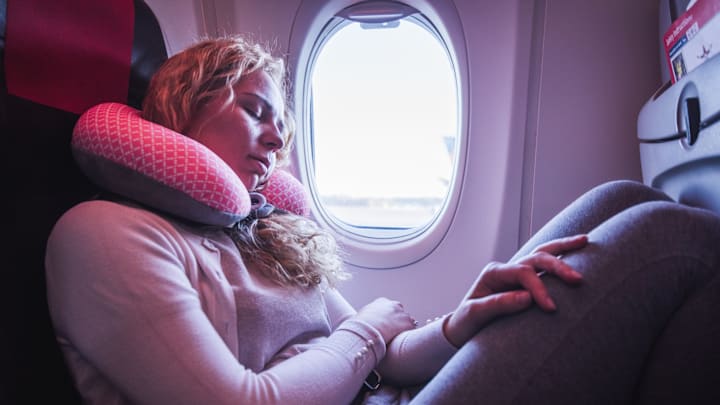For some travelers, getting on an airplane is a good excuse to grab a neck pillow and catch up on their sleep. And while there’s nothing inherently wrong with that, there are a couple of reasons why you don’t want to be dozing during the take-off and landing portions of the flight.
According to Travel + Leisure, napping during the bookended portions of a plane ride is inadvisable. Why? Typically, any sort of mechanical complication or anomaly is more likely to happen in the take-off, approach to the runway, and landing phases of air travel. Airplane manufacturer Airbus cites these as “highly complex flight phases” that have a lot of variables, from weather to air traffic communication to clogged airspace.
If you’re asleep and are jolted awake, you’re going to be less cognitively prepared to follow instructions or act in the event of an emergency. While a true aviation crisis is unlikely—there may be as little as one fatal air accident for every 16 million flights completed—you’ll want to be alert in the event one happens.
The second reason is comparatively trivial but still important. Ascent and descent is when airplane passengers tend to experience discomfort in their ears due to changes in cabin pressure. Known as ear barotrauma, or airplane ear, it’s when sudden air pressure changes result in stress to your eustachian tubes, which run from your middle ear to your throat and help regulate air movement.
This discomfort can be alleviated by moving the jaw or swallowing—but not if you’re asleep. Nodding off means you might be more likely to experience pain or pressure in the ear. (Ear barotrauma is also more likely with colds or allergies or with connecting flights, which mean more air pressure changes.)
Remaining awake and alert will allow you to take steps to avoid ear barotrauma, like faking a yawn, as well as be prepared to take any necessary action in case something goes awry. If you need to sleep, wait until you're at cruising—or napping—altitudes.
[h/t Travel + Leisure]
